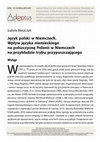Papers by Izabela Błaszczyk
Complementizer Semantics in European Languages, 2016

Adeptus, 2015
Polish in Germany. The influence of German on the speech of Polish heritage speakers (Polonia) il... more Polish in Germany. The influence of German on the speech of Polish heritage speakers (Polonia) illustrated by the example of the use of the conditionalPolish in Germany has hardly been analyzed systematically so far, although a large population with Polish ancestry can be found there. This paper reveals how Polish heritage speakers in Germany characteristically use the conditional. The study’s findings are the result of an initial analysis of the ‘Hamburg Corpus of Bilingualism of Polish in Germany’ (HamCoPoliG). The article concludes by comparing these specific results with current, general research on heritage speakers’ use of conditional forms and shows that not all phenomena can be explained by the influence of German. Język polski w Niemczech. Wpływ języka niemieckiego na polszczyznę Polonii niemieckiejJęzyk polski Polonii niemieckiej stanowi zagadnienie, które do tej pory prawie wcale nie było systematycznie badane, mimo że Polonia jest w Niemczech liczna. Poniższy artykuł prz...

Ziel: Diese Arbeit setzt sich mit dem Gebrauch von by durch Herkunftssprecher des Polnischen, der... more Ziel: Diese Arbeit setzt sich mit dem Gebrauch von by durch Herkunftssprecher des Polnischen, deren dominante Sprache das Deutsche ist, auseinander. Anders als in traditionellen Grammatiken werden die entsprechenden Formen dabei nicht als Ausdruck eines modus conditionalis angesehen; vielmehr wird by als klitischer Irrealis-Marker gewertet. Das Ziel der vorliegenden Studie ist es, die in diesem Bereich bei erwachsenen Herkunftssprechern auftretenden sprachlichen Phanomene umfassend zu beschreiben und adaquat zu analysieren. Methodologischer Ansatz: Die Basis fur die Untersuchung stellt die Analyse von bilingualen Korpora (u.a. des Online-Korpus “Hamburg Corpus of Polish in Germany”) dar. Die Auswertung der Korpusdaten wies auf einzelne Auffalligkeiten hin, die bei erwachsenen Herkunftssprechern des Polnischen im Bereich des Gebrauchs des klitischen Irrealis-Markers by auftreten. Hierzu gehoren u.a. das Doppeln sowie Auslassen des Irrealis-Markers, eine Praferenz fur Indikativformen ...
Semantic functions of complementizers in European languages, 2016
The paper is structured as follows. For all languages under analysis, first, a general overview o... more The paper is structured as follows. For all languages under analysis, first, a general overview of the complementizer system is made. In what follows, complementation strategies are described, beginning from the basic complementizer like čto in Russian, to 'process' complementizers like kak, then indirect question markers (li and dali), complement uses of adverbial clause markers, irreal complementizers and so on. Apart from that, some more general issues are considered: for instance, ordering of the matrix clause and the embedded one, the status of constructions without an overt complementizer, stylictic restrictions and semantic contrasts in the complementizer system.
Books by Izabela Błaszczyk

Wenn man die polnische Sprache erbt… Beschreibung und empirische Analyse zum Irrealis-Marker by im Polnischen und seiner Verwendung bei Herkunftssprechern mit Deutsch als dominanter Sprache , 2018
Purpose: This dissertation focuses on the usage of the irrealis marker "by" by heritage speakers... more Purpose: This dissertation focuses on the usage of the irrealis marker "by" by heritage speakers of Polish with German as their dominant language. While in traditional grammars the respective forms are described as expressions of the conditional mood, in this study "by" is considered to be a clitic irrealis marker. The present study aims to discover and analyze the linguistic phenomena that appear in the language of adult heritage speakers in connection with the irrealis marker "by".
Methodological approach: The basis for my research was the analysis of bilingual corpora (e.g. the “Hamburg Corpus of Polish in Germany”). The data gained from the corpora demonstrated that the usage of the irrealis marker by adult heritage speakers deviates from the baseline. For example, adult heritage speakers tended to double or omit the irrealis marker, to prefer indicative forms, or to show difficulties concerning the positioning of by. In a second step, an online test was created, which consisted of two parts: (1) a grammaticality judgment task, (2) an open question. The analysis combined qualitative and quantitative methods (e.g. the Mann-Whitney-U test).
Findings: The quantitative analysis of the data revealed significant differences between the usage of the irrealis marker by adult heritage speakers of Polish and the monolingual control group, as well as striking parallels with phenomena of language acquisition in early childhood. Adult heritage speakers tend to give preference to a constant positioning of the clitic in the sentence, be it before the verb resp. predicate or in Wackernagel position. Contrary to the enclisis-hypothesis, adult heritage speakers of Polish prefer to position the verbal clitic by before e.g. the l-participle. On the whole, the usage of the clitic irrealis marker "by" by adult heritage speakers of Polish with German as their dominant language is characterized by simplification and innovation.











Uploads
Papers by Izabela Błaszczyk
Books by Izabela Błaszczyk
Methodological approach: The basis for my research was the analysis of bilingual corpora (e.g. the “Hamburg Corpus of Polish in Germany”). The data gained from the corpora demonstrated that the usage of the irrealis marker by adult heritage speakers deviates from the baseline. For example, adult heritage speakers tended to double or omit the irrealis marker, to prefer indicative forms, or to show difficulties concerning the positioning of by. In a second step, an online test was created, which consisted of two parts: (1) a grammaticality judgment task, (2) an open question. The analysis combined qualitative and quantitative methods (e.g. the Mann-Whitney-U test).
Findings: The quantitative analysis of the data revealed significant differences between the usage of the irrealis marker by adult heritage speakers of Polish and the monolingual control group, as well as striking parallels with phenomena of language acquisition in early childhood. Adult heritage speakers tend to give preference to a constant positioning of the clitic in the sentence, be it before the verb resp. predicate or in Wackernagel position. Contrary to the enclisis-hypothesis, adult heritage speakers of Polish prefer to position the verbal clitic by before e.g. the l-participle. On the whole, the usage of the clitic irrealis marker "by" by adult heritage speakers of Polish with German as their dominant language is characterized by simplification and innovation.
Methodological approach: The basis for my research was the analysis of bilingual corpora (e.g. the “Hamburg Corpus of Polish in Germany”). The data gained from the corpora demonstrated that the usage of the irrealis marker by adult heritage speakers deviates from the baseline. For example, adult heritage speakers tended to double or omit the irrealis marker, to prefer indicative forms, or to show difficulties concerning the positioning of by. In a second step, an online test was created, which consisted of two parts: (1) a grammaticality judgment task, (2) an open question. The analysis combined qualitative and quantitative methods (e.g. the Mann-Whitney-U test).
Findings: The quantitative analysis of the data revealed significant differences between the usage of the irrealis marker by adult heritage speakers of Polish and the monolingual control group, as well as striking parallels with phenomena of language acquisition in early childhood. Adult heritage speakers tend to give preference to a constant positioning of the clitic in the sentence, be it before the verb resp. predicate or in Wackernagel position. Contrary to the enclisis-hypothesis, adult heritage speakers of Polish prefer to position the verbal clitic by before e.g. the l-participle. On the whole, the usage of the clitic irrealis marker "by" by adult heritage speakers of Polish with German as their dominant language is characterized by simplification and innovation.